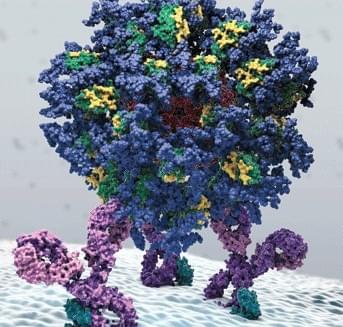All products and services are For Research Use Only and CANNOT be used in the treatment or diagnosis of disease.
Target Background
Antibody or immunoglobulin (Ig) is typically composed of two light chains and two heave chains. In human and other mammals, there are two classes of light chains, namely kappa (κ) chain and lambda (λ) chain. Once set, each B lymphocyte can express only one type of light chains. Antibody is the secreted form of the B cell receptor. Thus, B cells, as well as B cell malignancies, express either κ chain or λ chain on cell surface. Taking advantage of this clonal restriction characteristic, scientists intend to target the κ chain positive lymphoma cells with the normal B cells that express the reciprocal λ chain not affected. The impairment to humoral immunity is therefore minimized. While targeting pan-B cell markers (such as anti-CD19 CAR-T therapy) usually causes depletion of normal B cells and results in severe hypogammaglobulinemia.

Anti-Igκ CAR-T Cell Therapy
It was reported that anti-Igκ CAR-T cells showed cytotoxic activity against Igκ positive tumor cell lines and primary low-grade lymphoma and chronic lymphocytic leukemia (B-CLL) cells both in vitro and in vivo. Patients with refractory or relapsed CLL and non-Hodgkin lymphoma (NHL) are treated with anti-Igκ CAR-T cells in a phase I trial. These CAR-T cells are well-tolerated without adverse effects. The molecular signals of CAR peak at about 1 to 2 weeks after infusion and remain detectable for at least 6 weeks and up to 9 months. Two of five patients with relapsed NHL entered complete remission and three of three patients with multiple myeloma had stable disease associated with reduction of paraprotein, while two of two patients with CLL both progressed. These data confirm the safety and efficacy of anti-Igκ CAR-T cells therapy.
Animal Models for in vivo Study of anti-Igκ CAR-T Cell Therapy
We have established multiple animal models for the in vivo assay of anti-Igκ CAR-T cells. Different kinds of Igκ+ cells such as Daudi, JEKO-1, BJAB, CCL-120 cell lines, human primary CLL cells and some Igκ+ transfected cell lines are injected subcutaneously, intraperitoneally, or intravenously in SCID mice to induce a tumor in the mice. CAR-T treatment is applied when tumor progression reaches certain criteria. We are also able to provide rats and non-human primates (NHPs) models to meet your special requirement.
In vivo Assay Parameters and Techniques
At Creative Biolabs, we offer the most exquisite and comprehensive service platform for anti-Igκ CAR-T cell therapy research.
Efficacy Test
Tumor remission monitored by tumor cell analysis or bioluminescence imaging and survival curve tracking.
Viability and Bio-distribution Studies
Durability, GLP-compliant bio-distribution studies
Toxicity Evaluation
Pilot tolerability (MTD, The route of administration, Dose regimen/response/onset)
Clinical observation (body weight, feed consumption, ophthalmologic and clinical pathology)
Cytokine storm surveillance (fever, hypertension, prolonged cytopenia)
Complete necropsy, organ weight
Histopathology
Tumorigenicity study
GLP-Compliant Preclinical Test
All our experiments are performed by well-trained and experienced technicians in a GLP-compliant and IACUC-regulated facility.
As a frontier biotech service provider, Creative Biolabs has plenty of expertise and experience in the CAR-based therapy development. We now provide preclinical in vivo assay service to support your research on anti-Igκ CAR-T development. Our one-stop service package includes the development of animal models and the evaluation of efficacy, safety, viability and bio-distribution of anti-Igκ CAR-T cells.
References
For any technical issues or product/service related questions, please leave your information below. Our team will contact you soon.
 NEWSLETTER
NEWSLETTER
The latest newsletter to introduce the latest breaking information, our site updates, field and other scientific news, important events, and insights from industry leaders
LEARN MORE NEWSLETTER NEW SOLUTION
NEW SOLUTION
CellRapeutics™ In Vivo Cell Engineering: One-stop in vivo T/B/NK cell and macrophage engineering services covering vectors construction to function verification.
LEARN MORE SOLUTION NOVEL TECHNOLOGY
NOVEL TECHNOLOGY
Silence™ CAR-T Cell: A novel platform to enhance CAR-T cell immunotherapy by combining RNAi technology to suppress genes that may impede CAR functionality.
LEARN MORE NOVEL TECHNOLOGY NEW SOLUTION
NEW SOLUTION
Canine CAR-T Therapy Development: From early target discovery, CAR design and construction, cell culture, and transfection, to in vitro and in vivo function validation.
LEARN MORE SOLUTION